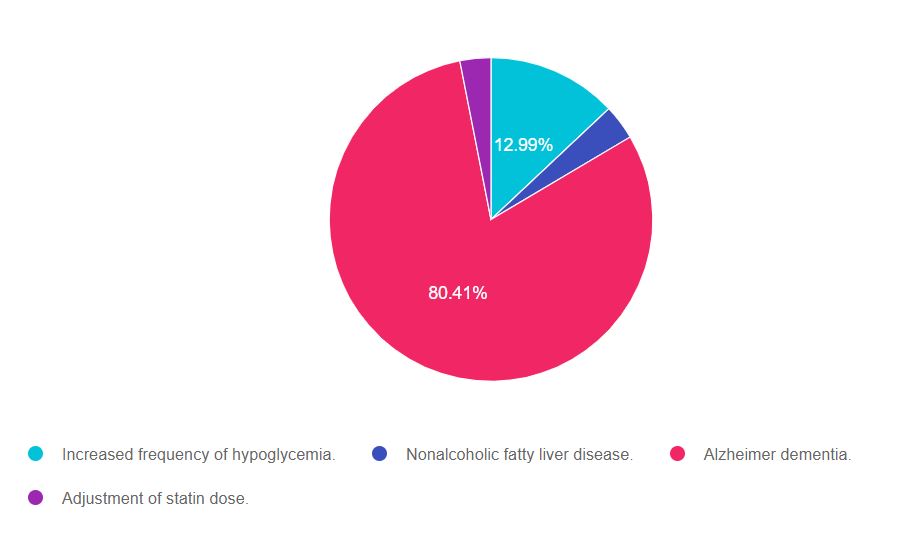
For our July 13th Question of the Week, 80% of respondents chose the best answer. GREAT JOB! We want to “take a closer look” at this question and determine strategies to choose the best response.
Before we start though, if you don’t want any spoilers and haven’t tried the question yet, you can answer below: Answer Question
Question 1: JR is 78, lives alone, and manages their diabetes with bolus insulin at breakfast and dinner and basal insulin at night. For the past few months, JR has had trouble remembering to take insulin with meals and JR’s most recent A1c is above 9%.
Which of the following is most likely contributing to this change of behavior for JR?
Answer Choices:
- Increased frequency of hypoglycemia.
- Nonalcoholic fatty liver disease.
- Alzheimer dementia.
- Adjustment of statin dose.

As shown above, the most common choice was option 3, the second most common answer was option 1, then option 2, and finally option 4.
Getting to the Best Answer
If you are thinking about taking the certification exam, the content of this practice test question will set you up for success. Being familiar with the experiences and co-conditions that impact older people’s ability to self-manage diabetes will be helpful for the exams.
Answers & Rationale
Answer 1 is incorrect, 12.99% chose this answer, “Increased frequency of hypoglycemia.” This is the juicy answer, but not the best one. Since JRs A1c is elevated, we don’t suspect hypoglycemia is causing the missed bolus doses of insulin. However, it is important to assess for hypoglycemic events for older individuals taking insulin.
Answer 2 is incorrect, 3.51% of you chose this answer, “Nonalcoholic fatty liver disease.” It is true that more people with diabetes are experiencing fatty liver disease. However, we get no indication from the question that JR has visceral adiposity, jaundice skin color or elevated liver enzymes. And fatty liver disease in the early stages is not commonly associated with forgetfulness.
Answer 3 is correct, 80.41% of you chose this answer, “Alzheimer dementia.” GREAT JOB, this is the best answer. People with diabetes and hyperglycemia are at higher risk of Alzheimer and vascular dementia. Dementia can decrease the ability to remember to take insulin and other medications which can then lead to hyperglycemia which can worsen dementia. If you suspect that someone is forgetting to take insulin due to dementia, reaching out to the referring provider for a cognitive assessment and evaluation is warranted. See screening tools here.
Answer 4 is incorrect, 3.09% of you chose this answer “Adjustment of statin dose.” A few years back, there was a social media buzz that statin therapy is associated with decreased cognition and memory loss. According to the ADA Standards of Care, multiple well designed studies have found no association between statins and memory loss.
We hope you appreciate this week’s rationale! Thank you so much for taking the time to answer our Question of the Week and participate in this fun learning activity!
Want to learn more about this topic? Enroll in our
Level 2 | Older Adults & Diabetes | 1.5 CEs

We have updated this content based on the ADA 2021 Standards of Care.
We are living longer and more people are getting diabetes. The American Diabetes Association has updated the Older Adults Standards, with special attention to considering reduction of medication and insulin therapy intensity. The older population has unique issues and special needs that require consideration as we provide diabetes self-management education. This online course highlights key areas of assessment, intervention, and advocacy for older clients living with diabetes.
Objectives:
- Self-management considerations for older individuals
- Strategies to prevent complications and maintain optimal quality of life
- The role of the Diabetes Educator as advocate
See Full Calendar for upcoming webinars and Virtual Courses.
Can’t make it live? All paid registrants are guaranteed access to the video presentation, handouts and podcasts.
Sign up for Diabetes Blog Bytes – we post one daily Blog Byte from Monday to Friday. And of course, Tuesday is our Question of the Week. It’s Informative and FREE! Sign up below!
[yikes-mailchimp form=”1″]Accreditation: Diabetes Education Services is an approved provider by the California Board of Registered Nursing, Provider 12640, and Commission on Dietetic Registration (CDR), Provider DI002. Since these programs are approved by the CDR it satisfies the CE requirements for the CDCES regardless of your profession.*
The use of DES products does not guarantee the successful passage of the CDCES exam. CBDCE does not endorse any preparatory or review materials for the CDCES exam, except for those published by CBDCE.








